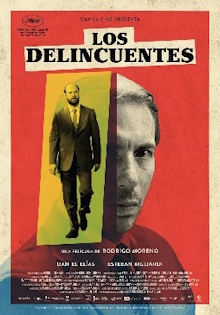Why does it seem like running a clever scam is a running theme in Argentinean films? This one starts with a straightforward heist but at its core is the quest for freedom that perhaps money can buy. Of course there is more than one kind of freedom and there’s a whiff of Don Quixote in the main character’s dream of it. This is a long film however and it might even leave you wondering at the end what’s the point of it all. But I believe in between the subtle black humor, beautiful shots of both the city of Buenos Aires and the remote countryside of Alpa Corral, and its myriad distractions, this is more than worth watching.
Morán is a middle-aged, single man who lives in Buenos Aires. For some years he has been working in a bank and so is trusted to access the vault. One day one of the clerks Román asks for permission to leave early so that he can get his neck brace removed. Without enough staff in the branch, Morán is given the key of another clerk and enters the vault himself. He takes the opportunity to clean out the cash there into a bag and calmly walks out, knowing full well that his actions are captured on CCTV. He later meets with Román and gives the bag to him. The money is the equivalent to how much the both of them would earn in salary until retirement, he explains. His plan is to confess, do his time in prison and when he is released the two of them will split the money equally. Morán then takes a trip to Alpa Corral, spending some time there before turning himself in. Meanwhile Román is increasingly anxious about the bag of cash in his apartment as the bank investigates the remaining staff for collusion, hiding the secret from his wife. Eventually he goes to visit Morán in prison, who instructs him to go to a specific spot in Alpa Corral and hide the money there.
This is supposedly a heist film, yet doesn’t at all feel like it. It doesn’t care for building tension. Morán acts without hurry, doing things one step at a time and eventually even the stolen money loses importance. Instead the film allows itself to be carried away by myriad distractions. While Morán is eating lunch, the camera takes in the architecture of Argentina’s capital. In Alpa Corral, both Morán and Román take in the spectacular natural landscape and get caught up with a woman. There’s an existentialist feeling in this film as events take us farther and farther away from the heist. The names of both characters are obviously reversed versions of the other and in the same way their lives are both parallel and yet inversed. A seemingly boring and straight-laced bank worker like Morán is revealed to have a sensitive inner self. Meanwhile the already married Román allows himself to caught up in the former’s scheme and perhaps his dreams of a more exotic life.
As I observed at the beginning, the prolonged economic crisis in Argentina seems to have led to profound anxiety and skepticism about where money comes from. Here Morán has a perfectly respectable job and seems reasonably competent at it, yet still perceives his working life as a prison that keeps him from truly living the life that he wants. He would prefer to spend a limited number of years in a literal prison than work until retirement. Román on the other hand seems content enough to work but Morán’s plan tempts him with the possibility of escaping from his marriage into a relationship with a younger woman and a new life. Both then represents freedom of different stripes. The film is never so crass as to explicitly judge their choices, allowing instead events to play out naturally. But the upshot seems to be that in so narrowly pursuing one particular form of freedom, they get caught up in what they create inside their own minds and lose sight of the larger picture. Then again, that’s just one interpretation and many others are possible.
Usually I prefer films that are a little more structured with a coherent theme. But this one meanders in such a beautiful way, getting lost in its digressions, that it won me over anyway. It’s a film that wonderfully demonstrates its own freedom from genre conventions and expectations.
